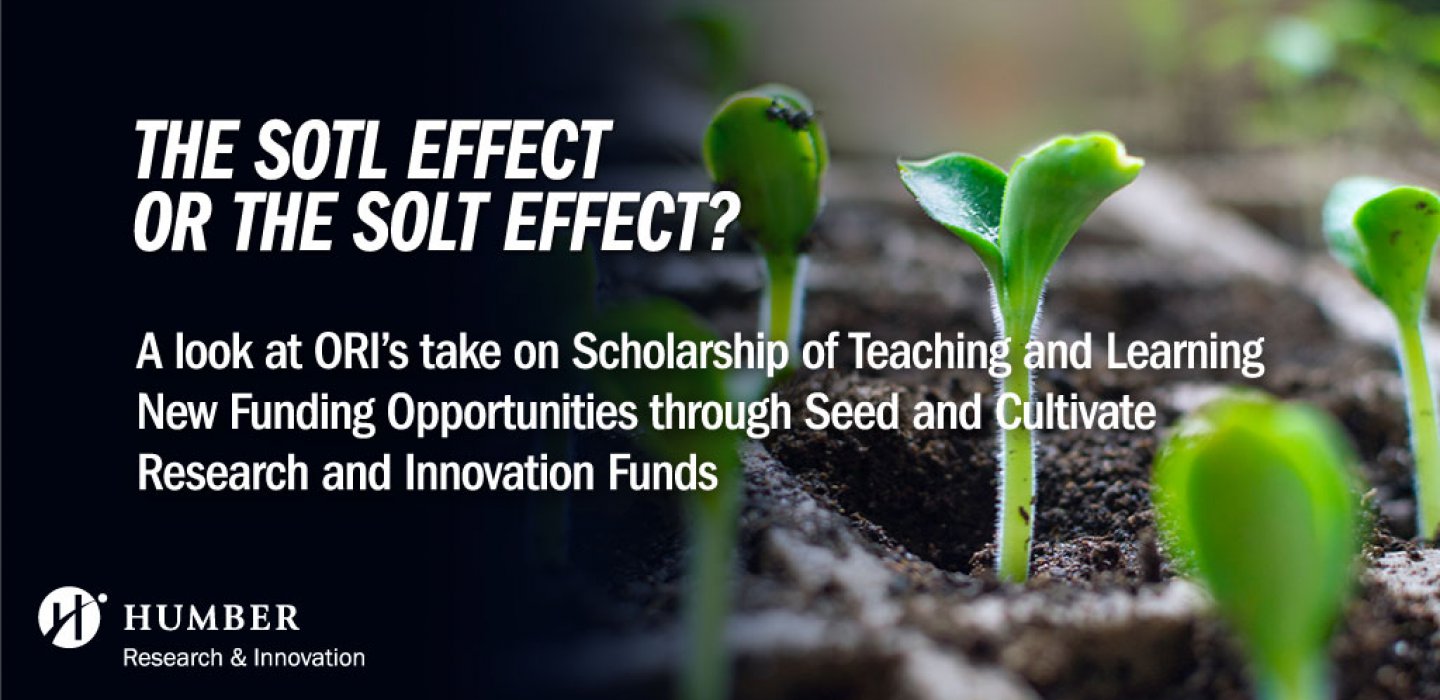“The work of the professoriate might be thought of as having four separate, yet overlapping, functions. These are: the scholarship of discovery [research]; the scholarship of integration [making connections across the disciplines]; the scholarship of application [applying knowledge responsibly to consequential problems, to help individuals as well as institutions]; and the scholarship of teaching [the work of the professor becomes consequential only as it is understood by others].” – Ernest L. Boyer (1990, p. 68)
Over three decades ago, Ernest L. Boyer published his renowned book Scholarship Reconsidered: Priorities of the Professoriate. He sought to redefine the relationship between scholarship and teaching performed in academia and deconstructed the traditional teaching vs. research paradigm. His work emphasized the role of reflective teaching as an essential component of a professor’s everyday scholarly life. With the growing awareness of academic institutions as pillars of learning, Boyer’s initial term “scholarship of teaching” was expanded into “scholarship of teaching and learning” (SoTL).
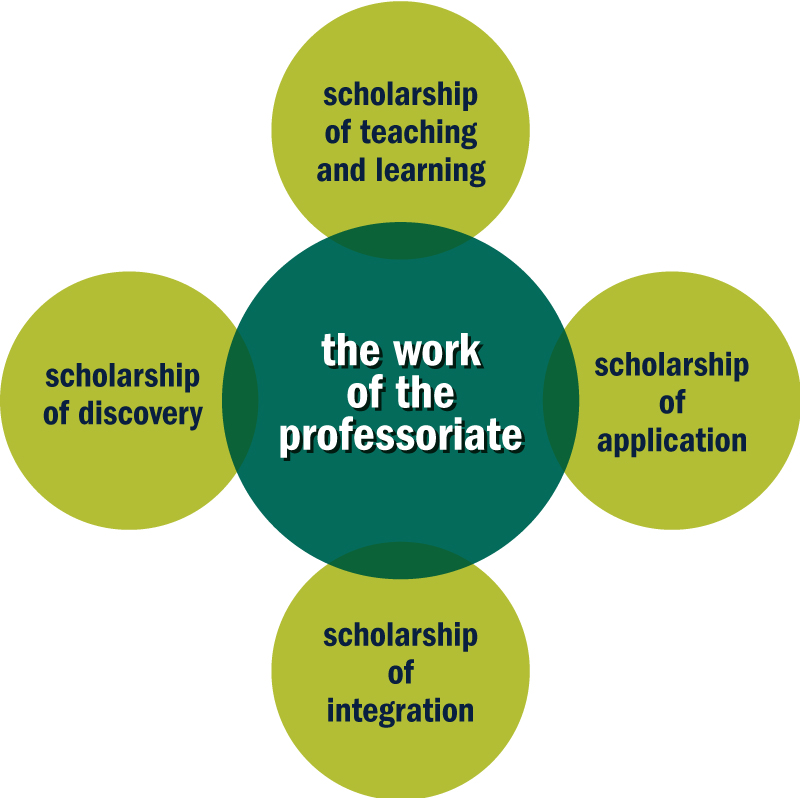
The Field of SoTL
The Scholarship of Teaching and Learning (SoTL) is a growing field in postsecondary and polytechnic education. SoTL traditionally involves faculty-driven projects to enhance teaching through research-based and research-informed critical reflection and discovery. We have observed that SoTL is a systematic inquiry into teaching practices and is done by faculty in their classrooms to inform improvements to academic programming and enhance student’s learning outcomes. Ultimately, it contributes to a larger body of teaching and learning research.
As of 1st April 2021, Humber’s Scholarship of Teaching and Learning (SoTL) was incorporated into the family of Humber’s Office of Research & Innovation (ORI).
Let’s take a brief moment and ask ourselves, “What is critical reflection, what do we mean by discovery and is a systematic inquiry not the same thing as a focused curiosity?” “Is it not ‘Research’, plain and simple?”, we posit. But, before we continue, let’s also remember the Learning aspect in the Scholarship of Teaching and Learning.
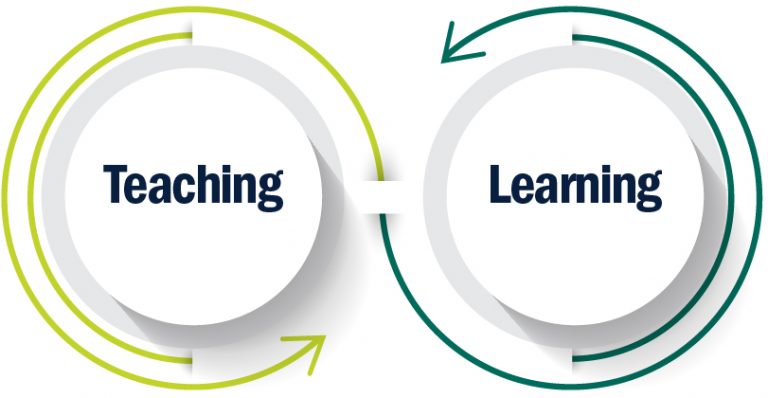
“What is research?” if not the discovery and interpretation of facts, revision of accepted theories or laws in the light of new facts, or practical application of such new or revised theories or laws. (Merriam-Webster, n.d.). ORI encourages and supports the research community to engage in a holistic conversation encapsulating ‘research’. Applied research and an innovative mindset are competent skills that can lead the Humber community in developing resilient citizens who are empowered to thrive in an ever-changing era of innovation and digitization. At ORI, we also embody the very same mindset, and among ORI, we house emerging researchers and innovation experts, and we embrace research as a ceremony.
“I think that the thing I most want you to remember is that research is a ceremony. And so is life. Everything that we do shares in the ongoing creation of our universe.” – Shawn Wilson, Author, Research is Ceremony
In a conversation with our team, we discussed the core principles at the heart of SoTL, which is to say, at the heart of Research. As Humber’s Office of Research & Innovation (ORI) continues to uncover innovative solutions that can further support faculty to identify, differentiate, research, and lead topics that matter most to them and better inform and improve both their teaching practice and significantly impact students to lead, transform and differentiate; we would like to humbly share with you how we aim to transform the Scholarship of Teaching and Learning through an ORI lens.
“For the things we have to learn before we can do them, we learn by doing them.” – Aristotle
“If we knew what it was we were doing, it would not be called research, would it?” – Albert Einstein
“Develop a passion for learning. If you do, you will never cease to grow.” – Anthony J. D’Angelo
“The beautiful thing about learning is that no one can take it away from you.” – B.B. King
SoTL: Redefined
Usually, we think of SoTL researchers as faculty performing simultaneous roles of teachers and researchers. However, instead of conducting research separately from teaching practices, their teaching IS their research. Research is at the core of what they do as SoTL researchers. Similarly, think of students as simultaneously playing the role of learners and research participants in the SoTL case studies and projects. “Tell me and I forget. Teach me and I remember. Involve me and I learn” – Benjamin Franklin.
“The precise definition of the scholarship of teaching and learning has been contested, but a consensus has formed within growing circles in academia that there is scholarly research to be done on teaching and learning, that the systematic creation of rigorous knowledge about teaching and learning is a crucial prerequisite to responding to major challenges facing academia, that this knowledge must be shared publicly and should build cumulatively over time, and that the explorations of this area should be conducted by academics from all disciplines, not just those with appointments in schools of education.” – David Pace (2004, p.1174).
In the words of Jimmy Heath, “Teaching is learning. When you’re teaching full-time you have to do research, stay current.” Wanda Landowska iterated, “The most beautiful thing in the world is, precisely, the conjunction of learning and inspiration. Oh, the passion for research and the joy of discovery!” Neil Armstrong rightfully said, “In much of society, research means to investigate something you do not know or understand.” Claude Bernard claims, “It is what we know already that often prevents us from learning.”
Research, be it applied research, phenomenon-driven research, or research in the form of capstone projects and SoTL, is as much about learning as teaching. It is an accepted and celebrated aspect of research.
SoTL: ORI Lens
ORI aims to further develop and ignite a passion for engagement, curiosity, discovery, teaching, learning and, in one word: Research. We continue to aid and work towards removing any possible barriers that may inhibit faculty from walking the path of research. We encourage and celebrate our seasoned researchers, and we are laying the foundations to make research accessible and approachable for our emerging researchers. The “Researchers Journey” can be considered as a companion to walk along with; a journey or a process that one can embark on to go from ‘emerging researcher’ to ‘savvy researcher’.
The ORI team will continue to work closely with faculty to test new methods in the classroom, support faculty engagement in reflective teaching, heightening the quality of the learning experience for all students at Humber; thus, striving to immerse students in the sort of innovative thinking and knowledge work that they will use in future workplaces.
But wait; there’s so much more:
We are taking SoTL beyond the existing dimension and capability afforded to faculty and researchers by the current Teaching Innovation Fund (TIF). We are restructuring the new funding opportunities and transforming the Scholarship of Teaching and Learning to incorporate the following, in effect from 1st October 2021:

Seed Research and Innovation Fund
- “Discovery-oriented”
- Inspired by the earlier Teaching Innovation Fund
- Ideal for Emerging Researchers
- Catered towards classroom-based teaching and learning
- Funding amount: $1,500

Cultivate Research and Innovation Fund
- “Design-oriented”
- Going beyond the classroom
- Walking the “Researcher Path”
- Investigating with external partners
- Funding amount: $5,000.
The Seed and Cultivate fund will assist us in creating pathways for emerging researchers or emerging investigators to cross the bridge from answering an unanswered query all the way to applying for funding opportunities to take their project and remould it as an applied research opportunity.
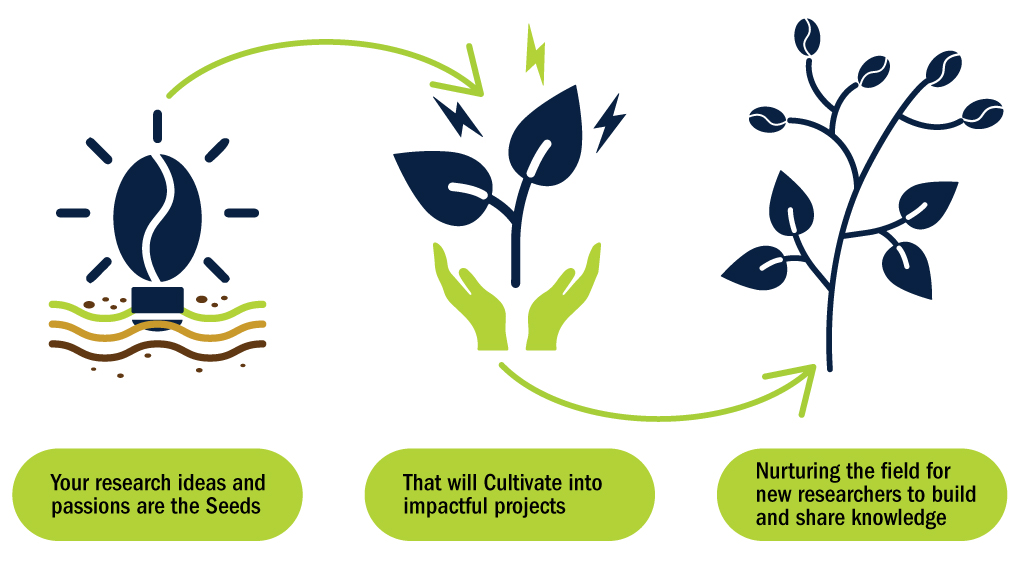
Think of research as a massive greenfield, rich, abundant and filled with a massive scope of discovery and wonder. These ‘research greenfields’ are sustainable, and ‘sky is the limit’ when it comes to research. Think of emerging researchers and initial research projects as ‘seeds’ being planted in the richness of research. As researchers observe the seed they have sown begins to flourish and ‘cultivate’, these emerging researchers, in turn, cultivate into savvy researchers. Think of students as ‘gardeners’ assisting in sowing the seeds of discovery and embracing, adopting and learning along the path of discovery and research.
According to Stevens (2001), many researchers undertake research because it emerges from their own interests or concerns. Åkerlind (2008a) further claimed that researchers tend to focus on the impact of their research, not only for the field itself, but for “their standing within it” (p. 26), publishing in part to gain a reputation amongst their disciplinary peers. Thus, Åkerlind (2008b) argued, researchers aim to achieve both an “internal sense of competence and success” and an “external recognition” (p. 246). The Seed and Cultivate Research and Innovation Funds will provide opportunities to faculty and emerging researchers to pursue topics they are passionate about and contribute to a body of knowledge within the Humber community and beyond.
Check out the SoTL Handbook for an in-depth overview, including program information (funding amount, who can apply and duration of case study/research, etc.), process roadmap and description of workshops that will accompany each of the newly restructured funding opportunities; these workshops will inform and enable faculty and emerging researchers to learn, prepare and embrace research, in turn, to research with confidence and support, with an opportunity to grow and allow for future research possibilities. For further enquiries, reach out to the ORI team at researchprojects@humber.ca to proceed with an idea you would like to develop into a research study. Development, Community and Continuity: these three themes define our approach to supporting faculty through their research projects’ developmental process.
The above new funding opportunities will be open for submissions and participation throughout the year, giving faculty the chance to participate in research at their convenience.
SoTL Research or Applied Research: Let’s not pick one; let’s pick both!
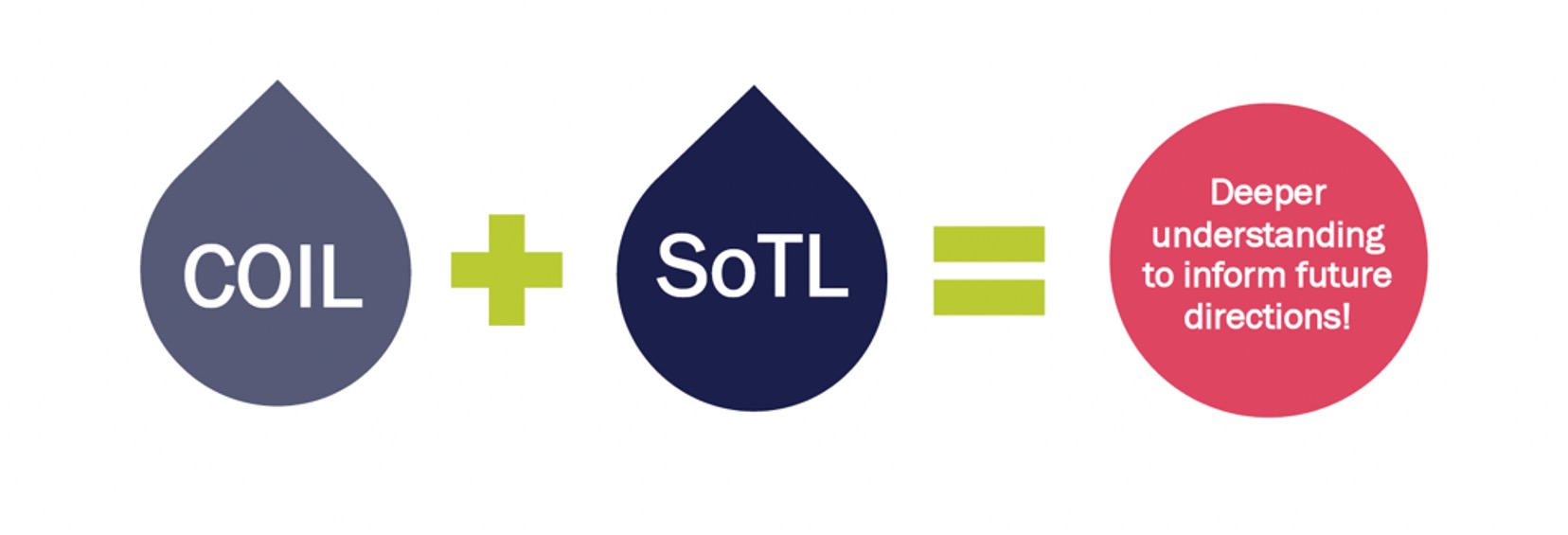
While applied research projects look outward—receiving external funding and collaborating with industry and community partners to provide students with valuable experiential learning opportunities – SoTL research projects are believed only to look inward.
However, over conversations with some principal investigators of earlier research projects, we have learned that SoTL research, just like applied research, often collaborates with an industry expert (an SME, an ex-Humber graduate-turned-entrepreneur) or a collaborative partner through Humber’s Collaborative Online International Learning (COIL).
COIL provides students with project-based, co-taught intercultural learning experiences by faculty/staff at two or more partner institutions in different parts of the world. In addition, COIL allows for students’ authentic and equitable intercultural and experiential learning opportunities through virtual project-based collaboration with global academic, industry, and/or community partners within their existing Humber program!
The Office of Research & Innovation will lead research projects in teamwork with the Collaborative Online International Learning to enable faculty to:
- Improve their ability to research their own teaching and enhance their instructional practice.
- Increase their confidence as a researcher.
- Discover further research questions prompted by the projects.
- Interact with faculty across disciplines on collaborative projects.
- Connect their interests in teaching and learning to a recognized body of research.
- Build an applied research initiative.
- Build a foundation for future grant applications.
- Expand Humber’s community of research and innovation.
To expand faculty-student-industry-community applied research initiatives and to further Humber’s Research and Innovation mandate, aligned to Humber’s Centres of Innovation (COIs) network and Humber’s Strat Plan, the Seed and Cultivate Research and Innovation Funds, in collaboration with COIL, will provide further opportunities to grow Humber’s research community to further comprehensive internationalization. ORI looks forward to working closely with the COIL team on future research initiatives.
By expanding the Scholarship of Teaching and Learning, ORI is committed to supporting Pillar #1: Career-Ready Citizens as defined in Humber’s 2018-2023 Strategic Plan- “transform education by creating opportunities for all students to participate in meaningful experiential learning, with a focus on work-integrated learning and applied research” (Humber College, 2018).
Through research, applied research, collaborative assignments, (capstone) projects, new digital learning and engagement approaches, and/or WIL experiences, ORI supports the development of 21st-century workforce skills in the Humber Learning Outcomes (HLOs) framework and provides opportunities for experiential applied learning experiences.
In the 2020/2021 fiscal year, 20 SoTL projects were awarded, and 12 students were hired as research assistants. The research spanned a wide range of interests, including students’ engagement in the classroom, building educational apps, intercultural understanding and diversity in the classroom, new teaching methodologies that promote active learning and students’ feedback on online learning. We look forward to regularly highlighting and disseminating future achievements and contributions through research supported by the Seed and Cultivate Research and Innovation Funds.
Humber’s Office of Research & Innovation looks forward to supporting our faculty through their journey in reflection and research by providing resources and support mechanisms to enhance their teaching and learning objectives. We encourage faculty to pursue projects aiming at furthering the Scholarship of Teaching and Learning and Research and Innovation by applying for Seed and Cultivate funding. These research initiatives will, in turn, help nurture a culture of innovation at Humber College. By sharing the observations and findings and including student participation, we will identify student needs better, enhance teaching practice, and ultimately grow as a research, innovation, learning and knowledge entity.
Like Steve Jobs, at ORI, we want to put a dent in the universe; we want to create opportunities for everyone to engage and participate in research. We are all researchers, though we may initially not recognize it! So, connect with us and let us support you; all it takes is an idea or a curiosity that you may have, and that’s all it takes to begin your research journey. Through research that is accessible and approachable, ORI aims to expand and encourage dialogue that fosters creativity all the way to innovation!
References
Åkerlind, G. S. (2008a). An academic perspective on research and being a researcher: An integration of the literature. Studies in Higher Education, 33(1), 17-31.
Åkerlind, G. S. (2008b). Growing and developing as a university researcher. Higher Education, 55(2), 241-254.
Boyer, E. L. (1990). Scholarship reconsidered: Priorities of the professoriate (Exp. ed.). Jossey-Bass.
Humber College. (2018). Lead, Transform, Differentiate: 2018-2023 Strategic Plan. https://humber.ca/strategic-plan/assets/documents/2018-2023-strategic-plan-complete-accessible.pdf
Pace, D. (2004). The Amateur in the Operating Room: History and the Scholarship of Teaching and Learning. The American Historical Review, 109(4), 1171-1192. https://doi.org/10.1086/530753
Stevens, S. (2001). Fieldwork as commitment. Geographical Review, 91(1-2), 66-73.
SoTL Handbook: Seed and Cultivate Research and Innovation Funds
